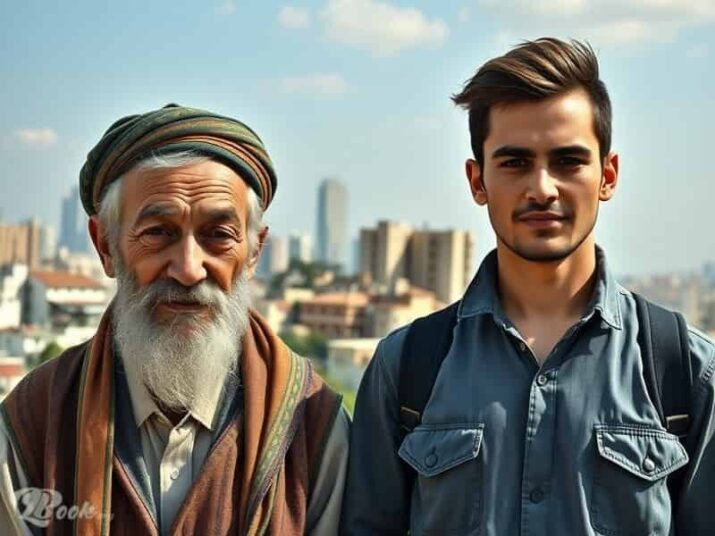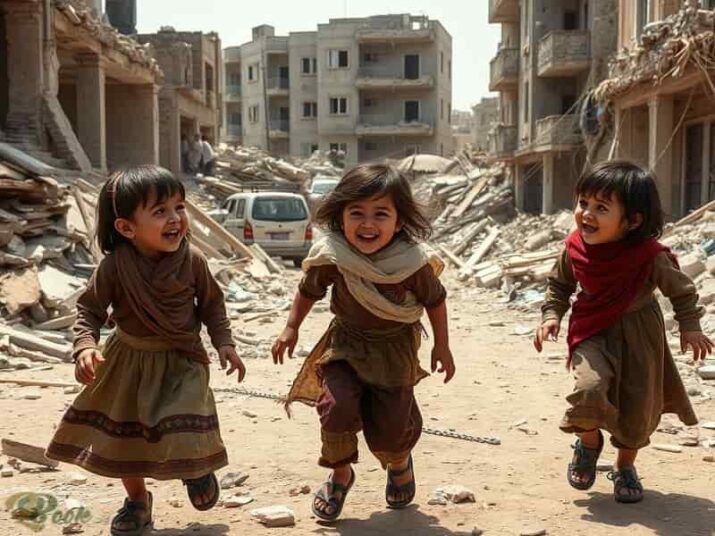Impact of Ongoing Conflicts on Generations Psyche in Lebanon
Impact of Ongoing Conflicts on Generations Psyche in Lebanon
The Impact of Ongoing Conflicts on the Psyche of Generations in Lebanon
When I decided to return to my homeland, Lebanon, after 17 years of living abroad, that return carried many dreams and hopes. I had a strong desire to reconnect with my roots, interact with my family and friends, and see how things had changed in my country after all those years. However, what I encountered was a real shock. Upon meeting my family and friends, I noticed a significant change in their personalities and ethics, and I realized that the deep impact of the ongoing conflicts had left its mark on their souls.
The experience of returning was filled with conflicting emotions; I felt nostalgia for my homeland, but I was also saddened by what I saw—an absence of security and stability. It was not just a return to a place; it was a return to a community suffering from the effects of the civil war, which left behind wounds that are not easily forgotten. Generations have been born after the war, living in harsh conditions, far from stability and peace.
The conflicts did not stop after the civil war ended; Lebanon has witnessed several other wars, including Israeli attacks that led to widespread destruction in southern Lebanon. These wars did not leave only material scars but also claimed thousands of lives and caused deep psychological effects on society. The most recent war, which occurred a year ago, resulted in the deaths of over 6,000 people and the destruction of tens of thousands of buildings and institutions. These events reflect a tragic reality that Lebanon suffers from and confirm that the effects of wars transcend time, lingering in the memory of generations.

The Impact of the Civil War on Lebanese Society
Statistics and Figures
The Lebanese civil war, which lasted from 1975 to 1990, not only left material effects but also resulted in thousands of casualties and injuries. The estimated number of victims exceeds 150,000, making it one of the deadliest wars in modern history. Additionally, the war displaced millions of Lebanese, affecting the demographic structure of the country. This displacement not only impacts individuals but also families and communities, as many have lost contact with their loved ones.
The impact of the war on the social fabric was profound. It led to the destruction of traditional family and community structures, making it difficult to rebuild trust among individuals. Social interaction became filled with caution and suspicion, increasing tensions among different sects. Today, many Lebanese suffer from a loss of identity and belonging, finding themselves trapped between their painful past and an uncertain future.
The Effects of Conflicts on National Identity
The war significantly affected national identity, causing society to split into conflicting sects and parties. This division intensified the gap between Lebanese people, leading to the loss of the shared identity that once connected them. With each new conflict, divisions grew deeper, making it challenging for the Lebanese people to unite around common national issues. The Lebanese identity, once characterized by unity in diversity, became threatened, with each sect striving to achieve its interests at the expense of others.
This division manifested in ongoing political crises, making negotiation and understanding between political parties challenging. This state of division created an environment of mistrust, where Lebanese individuals interacted with one another cautiously, fostering feelings of isolation and alienation.
The First Generation After the War
Living Conditions
When we look at the first generation that grew up after the war, we find that they were raised in an environment filled with poverty and displacement. Many of these young people did not know the meaning of safety and stability, living under harsh conditions, lacking proper support. Poverty became an integral part of their daily lives, making it difficult for them to achieve their dreams and ambitions.
The absence of security and stability negatively impacted all aspects of life. Harsh living conditions, such as a lack of basic resources like water and electricity, made it challenging for individuals to think about the future. Instead, they were occupied with mere survival, leading to widespread feelings of frustration and anxiety. This harsh economic reality affected their mental health, with many becoming susceptible to chronic depression and anxiety.
Psychological Impact
The psychological impact of these conditions was profound. The first generation grew up with a constant sense of anxiety and depression, along with a loss of trust in others. The war was a traumatic experience that left clear psychological scars on this generation, making them feel that life was neither safe nor reliable. These effects are evident in their behaviors and how they cope with daily challenges. The loss of hope for the future turned them into hesitant individuals, unable to make bold decisions.
Research shows that many of these individuals suffer from post-traumatic stress disorder, making it difficult for them to adapt to daily life. Anxiety and fear of the future became part of their existence, affecting their ability to build healthy and stable relationships.
The Second Generation After the War
Growing Up in an Unstable Environment
As for the second generation, born into this chaos, they lived in an environment lacking positive role models. They were raised in an atmosphere of fear and anxiety, which affected their behavior and ethics. Quality education and strong role models were absent, making it difficult for them to develop positive values or realize their potential. Additionally, the absence of parents due to emigration or conflict exacerbated the issue, leaving children without guidance or support.
This generation faces immense social and psychological pressures, living in an environment filled with tensions and conflicts. The lack of social support and parental guidance leaves many feeling lost, impacting their personality development. The unavailability of social and economic opportunities further increases their sense of isolation.
Values and Ethics
This generation has witnessed a significant decline in national values. The level of ethics has noticeably decreased, and behaviors of violence and a lack of patriotism have emerged. Growing up in an environment devoid of safety and stability made it difficult for these youth to adopt positive values. The absence of a supportive environment led to a decline in the spirit of belonging and loyalty to the nation, making them feel disconnected from their history and identity.
This decline is reflected in their daily behaviors, where violence has become part of their culture. Many young people tend to use violence as a means to express their feelings or achieve their goals, increasing the risk of this phenomenon spreading throughout society.

The Impact of Internal and External Migration
Brain Drain
The migration of skilled individuals has significantly impacted Lebanese society. Lebanon has lost many bright minds, affecting its economic and social development. The emigration of educated and cultured individuals has left a substantial gap in society, exacerbating economic and social crises. Those who left represented hope for a better future, but their departure has increased suffering.
Brain drain is not limited to doctors and engineers; it also includes teachers, artists, and intellectuals, leading to a loss of cultural and intellectual wealth. This situation has impacted Lebanon’s ability to recover from its crises, making it difficult to attract investments or achieve sustainable development.
Undocumented Migrants
On the other hand, the presence of undocumented migrants in Lebanon has complicated the situation. These individuals often live in harsh conditions, increasing pressure on limited resources. Additionally, competition for jobs between Lebanese citizens and migrants has exacerbated economic and social crises. These circumstances make it challenging for Lebanese society to achieve stability and prosperity.
The impact of undocumented migrants extends to social issues, with rising tensions between local communities and migrants. This tension can lead to the spread of feelings of racism and discrimination, further deteriorating the social situation.
Economic Factors and Their Impact on Society
Unemployment and Poverty
Lebanon records high unemployment rates, increasing pressure on families, and affecting their daily lives. With the economic downturn and escalating crises, many find themselves trapped in a cycle of poverty, leading to a decline in quality of life. This poverty not only encompasses financial aspects but also includes limited access to education and healthcare, further complicating the situation.
Corruption and Its Impact on Development
Corruption is one of the main factors that hinders development in Lebanon. The lack of transparency and poor resource management directly affect the country’s ability to recover from crises. Corruption leads to the proliferation of nepotism and discrimination, increasing social and economic gaps.
Recommendations for Solutions
Enhancing Education
It is crucial to strengthen the education system in Lebanon. The state must invest in education as a means to build the character of future generations. Education is the key to building a better society and should be accessible to all, especially in affected areas. There should be a focus on vocational and technical education to meet market needs, helping to create future job opportunities.
Enhancing education should also include programs that promote human and national values. By emphasizing the importance of cooperation and participation, future generations can transcend sectarian divisions and work towards a common future.
Promoting Social Integration
The country needs programs that foster communication between different sects. Efforts should be made to create job opportunities for all, helping to reduce social tensions and enhance national belonging. Initiatives that support cooperation among various social and political groups should be encouraged, promoting national unity and reducing divisions.
Developing artistic and cultural programs can positively impact social integration. By organizing joint events, different groups can interact and get to know each other, contributing to building a cohesive community.
The Importance of Mental Health in the Recovery Process
Supporting Mental Health
As psychological and social pressures mount, it becomes essential to enhance mental health services in Lebanon. Individuals should have opportunities to access psychological support, whether through therapy programs or community support. Such programs can serve as a means to alleviate the effects of conflicts and strengthen the ability to adapt to difficult circumstances.
Building Supportive Communities
Building supportive communities can play a vital role in improving mental health. By fostering social connections and providing psychological support, individuals can feel that they are not alone in facing challenges. This social support can reduce feelings of isolation and enhance the collective spirit.
Focusing on Sustainable Development
The Importance of Sustainable Development
Sustainable development is key to a better future for Lebanon. By focusing on projects that promote environmental and economic sustainability, Lebanese society can begin to recover from the effects of conflicts. These projects should include education, health, and the environment, contributing to building a balanced community capable of facing challenges.
Partnership with Civil Society
Partnerships with NGOs and civil society can enhance efforts for sustainable development. By working together, individuals and communities can achieve common goals, contributing to improving the quality of life for all.

Conclusion
The impact of ongoing conflicts on the psyche of generations in Lebanon is a complex topic encompassing many social and psychological dimensions. Generations that grew up after the war bear deep wounds and face significant challenges in the current circumstances. Lebanese society needs to work diligently to build a better future that transcends these negative effects. We must remember that hope exists and that change is possible if there is will and determination.
By enhancing education and supporting social integration, these generations can begin to rebuild their shared identity and overcome the painful legacies of the past. The issues facing Lebanon today require collective efforts to build a cohesive society capable of facing challenges. Now, more than ever, Lebanon needs a new vision that transcends divisions and promotes the concept of unity in diversity, paving the way for a brighter future.
In conclusion, the challenges facing Lebanon are complex and multifaceted, but with will and cooperation, they can be overcome to build a better future for the coming generations.
Related Posts
- The Impact of Wars on Human Values and Ethics
- Fluctuating Generation and How Can Overcome Superficiality
- How to Build Positive Habits That Last a Lifetime
- Effective Strategies for Managing Stress at Work and Life
- Ignoring Emotions: Are We Living in an Unempathetic Society?
- Deception Among Christians: Faith and Contradiction
- How to Overcome Malice and Hypocrisy in Daily Life







